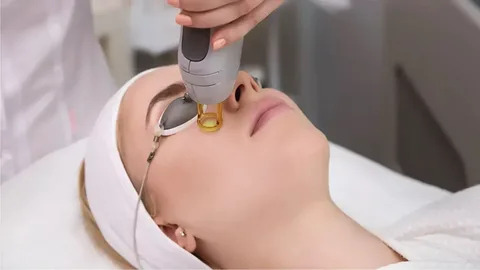Laser Skin Rejuvenation & Health:
Laser skin rejuvenation has become a popular way to improve skin fitness. Many people want to look younger and feel more confident. This treatment uses focused light beams to target skin problems. The technology helps reduce wrinkles, scars, and age spots. Modern laser treatments offer many benefits for aging skin.
They stimulate collagen production naturally in your skin. This process helps create smoother and firmer skin texture. Most people see results after just a few sessions. The treatment works well for various skin types and conditions. Your skin health can improve dramatically with the right approach.
Recovery Timeline and What to Expect
Your skin will look red and feel warm immediately after treatment. This reaction is normal and shows the laser worked properly. Swelling may occur for the first few days after treatment. Cool compresses and gentle moisturizers help with comfort during recovery. Most people return to work within one week.
Laser skin care safety includes following all aftercare instructions carefully. Your skin will peel or flake as it heals naturally. New skin underneath will be pink and sensitive at first. Complete healing usually takes two to four weeks total. Results continue improving for several months after treatment.
Understanding Different Types of Laser Treatments
Ablative lasers remove the top layer of skin completely. They work well for deep wrinkles and severe sun damage. Recovery time is longer, but results are more dramatic. Non-ablative lasers work beneath the skin surface without removal. These treatments have shorter recovery times and less discomfort.
Fractional lasers target small areas of skin at once. They leave healthy skin between treated spots for faster healing. CO2 lasers are powerful tools for serious skin problems. Erbium lasers offer gentler treatment with less downtime. Your doctor will choose the best option for your needs.
Preparing Your Skin for Treatment Success
Stop using retinoids and exfoliating products two weeks before treatment. These products can make your skin more sensitive to lasers. Avoid sun exposure and tanning beds for at least a month. Protect your skin with sunscreen every day during preparation. Schedule your treatment during cooler months when possible.
Tell your doctor about all medications and supplements you take. Some drugs can affect how your skin heals after treatment. Blood thinners may need to be stopped before your appointment. Antibiotics might be prescribed to prevent infections after treatment. Follow all pre-treatment instructions carefully for best results.
What Happens During Your Laser Session
Your doctor will clean your skin thoroughly before starting treatment. Protective eyewear keeps your eyes safe from laser light. A cooling device may be used to reduce discomfort. The laser handpiece moves across your skin in careful patterns. Most sessions take 30 minutes to two hours, depending on the area.
You might feel a warm sensation or slight stinging during treatment. Many people compare it to a rubber band snapping. Topical numbing cream can help reduce any discomfort you feel. Your doctor will check your skin regularly during the session. They adjust settings based on how your skin responds.
Managing Side Effects and Complications Safely
Redness and swelling are the most common side effects experienced. These symptoms usually resolve within a few days of treatment. Some people develop temporary changes in skin color or texture. Infections are rare but can occur without proper aftercare. Scarring is possible with deeper laser treatments or poor healing.
Choose an experienced doctor to minimize risks and complications significantly. Board-certified dermatologists have the most training and experience available. They understand how different skin types respond to treatments. Proper equipment maintenance is crucial for laser skin care safety. Always verify your provider’s credentials before scheduling any treatment.

Ideal Candidates for Laser Rejuvenation
People with fair to medium skin tones respond best. Those with realistic expectations get the most satisfaction from results. Good candidates have specific skin concerns like wrinkles or scars. You should be in good overall health before treatment. Non-smokers heal faster and have better results than smokers.
Pregnant women should wait until after delivery for treatment. People with active skin infections need to heal first. Those with certain medical conditions may not be suitable candidates. Dark skin tones require special laser settings and expertise. Your doctor will evaluate your skin during a consultation.
Cost Considerations and Treatment Planning
Single laser treatments typically cost between $500 and $3000 per session. The price depends on the area treated and laser type. Most people need multiple sessions for optimal results to be achieved. Package deals often provide better value for multiple treatments needed. Insurance rarely covers cosmetic laser procedures or treatments.
Consider the total investment, including all recommended sessions and aftercare. Budget for quality skincare products needed during recovery time. Time off work may be necessary depending on treatment intensity. Compare prices between qualified providers in your area carefully. Remember that the cheapest option may not be safest.
Long-term Results and Maintenance Requirements
Initial results appear as your skin heals over several weeks. Outcomes become visible three to six months after treatment. Most people see significant improvement in targeted skin concerns. Results can last several years with proper skin care routines. Sun protection is essential for maintaining your investment long-term.
Annual touch-up treatments help maintain your results over time. A good skincare routine supports your skin health between sessions. Regular sunscreen use prevents new damage from occurring daily. Healthy lifestyle choices also impact how long results last. Many patients report increased confidence and satisfaction with their appearance.
Choosing the Right Medical Provider
Research potential providers thoroughly before scheduling any appointments. Look for board certification in dermatology or plastic surgery specifically. Check online reviews and ask for before-and-after photos. Visit the office to see the equipment and meet staff members. Ask about their experience with your specific skin type.
A good provider will perform a thorough consultation first. They should explain all risks and benefits honestly and completely. Pressure to book immediately is a red flag warning. Quality providers answer all questions patiently and thoroughly. They should provide detailed aftercare instructions and emergency contact information.
Alternative Treatments to Consider First
Chemical peels offer similar benefits with less intensive recovery time. Microneedling stimulates collagen production without laser energy or heat. Injectable treatments can address specific wrinkles and volume loss. Professional facials improve skin health with regular maintenance appointments. At-home devices provide mild results for budget-conscious patients.
Your doctor may recommend combining treatments for better overall results. Some people prefer gradual improvement over dramatic single treatments. Starting with gentler options helps you understand your tolerance. You can always progress to more intensive treatments later. The best approach depends on your goals and comfort level.
Making Your Final Treatment Decision
Schedule consultations with multiple qualified providers for comparison shopping. Ask detailed questions about their recommended treatment plan specifically. Get written estimates including all costs and expected sessions needed. Take time to think about the decision without pressure. Consider starting with a small test area first.
Laser skin care safety should be your top priority always. Choose experience and qualifications over lower prices offered elsewhere. Trust your instincts about the provider and office environment. Good results require proper equipment, training, and aftercare support. Your skin health deserves the best care possible. Follow DPWorldNews if you want more health information.





